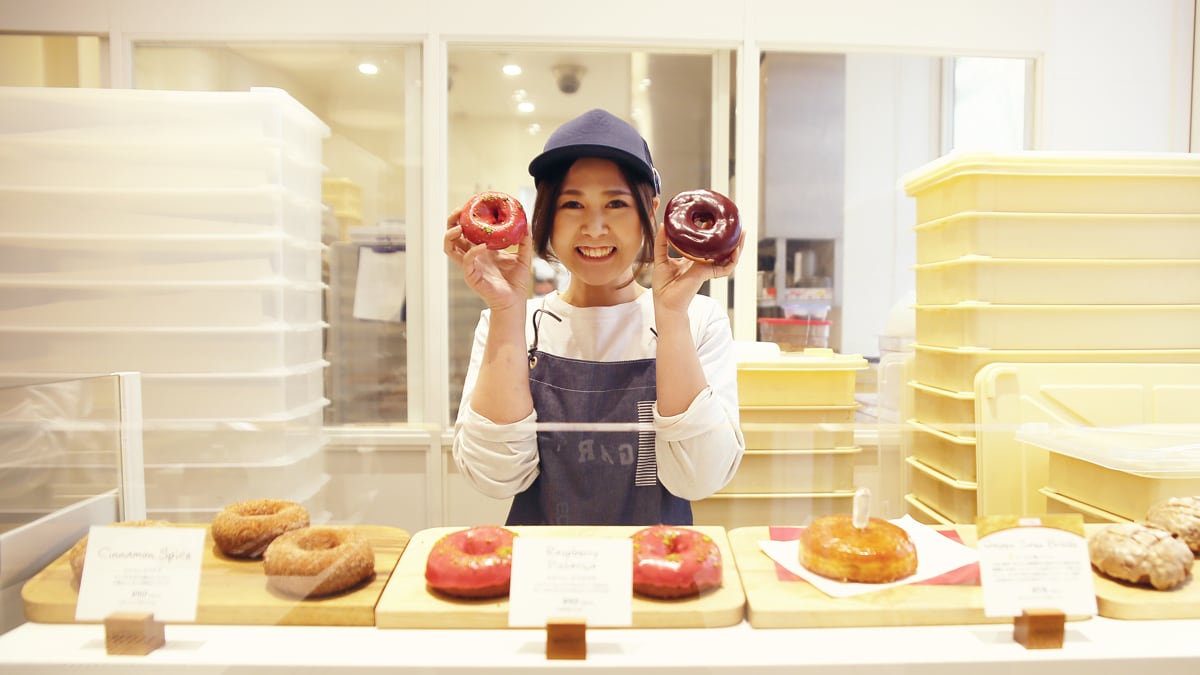Camden's Blue Star
Daikanyama, Shibuya
Blue Star Portland: Micah Camden, founder of Little Big Burger, opens a fancy doughnut shop with super-mega-frosted luxury $3.50 doughnuts and, briefly, doughnuts with fried chicken atop them.
Camden's Blue Star Tokyo: In Tokyo, Camden's Blue Star exists on something called the "log road." The log road is made entirely of wood and is tucked behind the actual road where cars go. For whatever, reason Google Maps believes the luxury doughnut shop is located inside the live-work building that's also home to the Tokyo office of Portland's Will Leather. Only women buy doughnuts inside Camden's Blue Star, which is located to one side of a cookware, spice and souvenir shop in the Fred Segal store. Next to doughnuts, it sells sundry items all bearing the unlikely truth that "Fred Segal Loves You." But you know what? Blue Star doughnuts in Tokyo are simply better than the American ones—less frosted, a little less sweet and a little more delicate, from perfect Cointreau-injected creme brulee just crisped on top to a holiday special apple cream cheese that comes with a little slice of fresh apple. But it's hard not to empathize with the elderly Japanese woman that Portlander Yayoi Yamamoto spoke to at the Blue Star opening in Osaka: "Why would I pay $4 for a doughnut?" she asked.
Navarre
Aoyama, Shibuya


Navarre Portland: In Portland's Kerns neighborhood, Navarre is a tiny, lovely, locally focused, farm-centric spot whose many jars of preserves make it look like a home kitchen. There, it serves trademark Spanish-influenced potato dishes alongside tasteful seasonal plates, accompanied by Oregon natural wines chosen according to the particular tastes of chef John Taboada—especially rarities like whole bottles of cult-favorite Minimus, say, or wines from Cameron and Bow & Arrow.

Navarre Tokyo: In Tokyo it is also like this, but the potatoes come with octopus and spicy mayo and are wonderful.

Original Pancake House
Harajuku, Shibuya
OPH Portland: Classic James Beard-winning home of Dutch babies and old people.
OPH Tokyo: My God, the eighth-floor Original Pancake House in Harajuku is almost classy—a place for affluent, slender women between the ages of 15 and 25 to eat pancakes with strawberries on top—the last Portland remnant of the trendy "pancake culture" that first took hold four years ago. (The Tokyo Slappy Cakes has closed.) If men are here, they are arm candy. The sole white person in the room—which is decorated with Portland guidebooks and a house copy of Kinfolk—is a silver fox with rumpled khakis who looked as if he fell off a yacht. Sounding for all the world like Dick Van Dyke, he tells his brunch date that "the reality of Portland is that it's kind of scummy." This statement seems to alarm her. In the meantime, I receive a Dutch baby filled with salmon, shrimp, avocado and—God help me—some of the loveliest radicchio I've had in some time, all piled perplexingly into a Dutch batter that remains just as achingly buttery as at the hometown original.
Tokyo Whisky Library
Minami-Aoyama, Minato

Multnomah Whiskey Library: Luxuriant fireplaced, chandeliered hall of portraits and lit-up racks of countless (OK, 1,500) bottles, with rare bottles and sophisticated cocktails—guarded by a doorman, with reserved seating for members and so many people waiting in line.
Tokyo Whisky Library: Many-chandeliered, old-timey Tokyo Whisky Library may share a name with Portland's Multnomah Whiskey Library, and it may look a whole hell of a lot like it, with brick walls and dark wood and lit-up library shelving filled with countless bottles. But there's no relation, Multnomah owner Greg Goodman says. "It's a compliment they did it, and they're very nice people," Goodman says. "I was surprised they didn't come up with their own name."


You enter Tokyo's Library through a second-floor door disguised as a bookcase. The cocktail list is a rudimentary grouping of Negronis and Manhattans, but gracious bartender Kengo Oda—elegant in his Prohibition vest aside from brass "Tequila Master" and "Whiskey Master" flair—recommends Japan's very first whiskey, an elegant and lightly smoky Taketsuru, along with equally elegant cold-smoked grapes.


Oda is disturbed, however, to hear that the Multnomah branch of the Library has 1,500 bottles. He has a mere 1,200.


Marukin
Ebisu, Shibuya

Marukin Portland: Counter-service spot serving the city's best tonkotsu broth with Carlton Farms pork—a delicate, light, lively balance.
Marukin Tokyo: I meet Marukin founder Hiroshi Kusuda at his Ebisu location of Marukin to discover a world of soups to look forward to in Portland, at a little elbow-bar space only two doors down from Kukai Ebisu (known in Beaverton as Kizuki). More than 20 years old, Marukin in Tokyo isn't trendy. It's a standby comfort—an old-school Hokkaido-style pork broth spot that warms the heart, with eight locations around town.


The tonkotsu at the Tokyo Marukin uses Japanese pork, of course, and the result is a smokier depth when compared to the equally lovely delicacy of Portland's Carlton Farms version. And lo and behold, Marukin Ebisu has both abura (oily) ramen and dense-brothed dipping ramen (tsukemen), not to mention a different thickness of noodle for each type of soup, including a fully pork-brothed shoyu I prefer to the American chicken-pork shoyu broth. But I leave feeling pretty damn good, nonetheless, about Portland's Marukin, even though I can still fondly call up the smoke from that Japanese pork.


